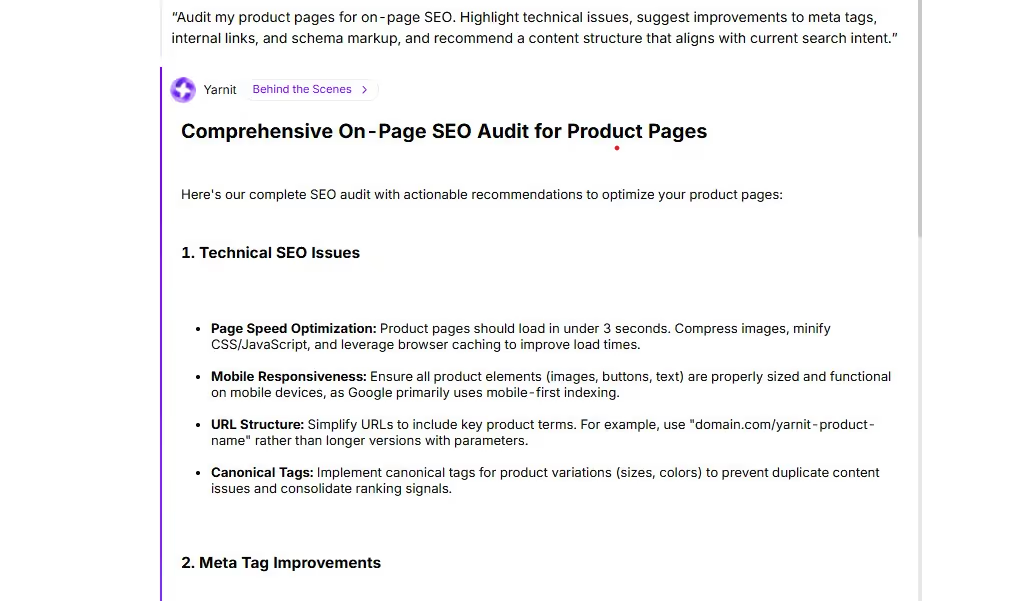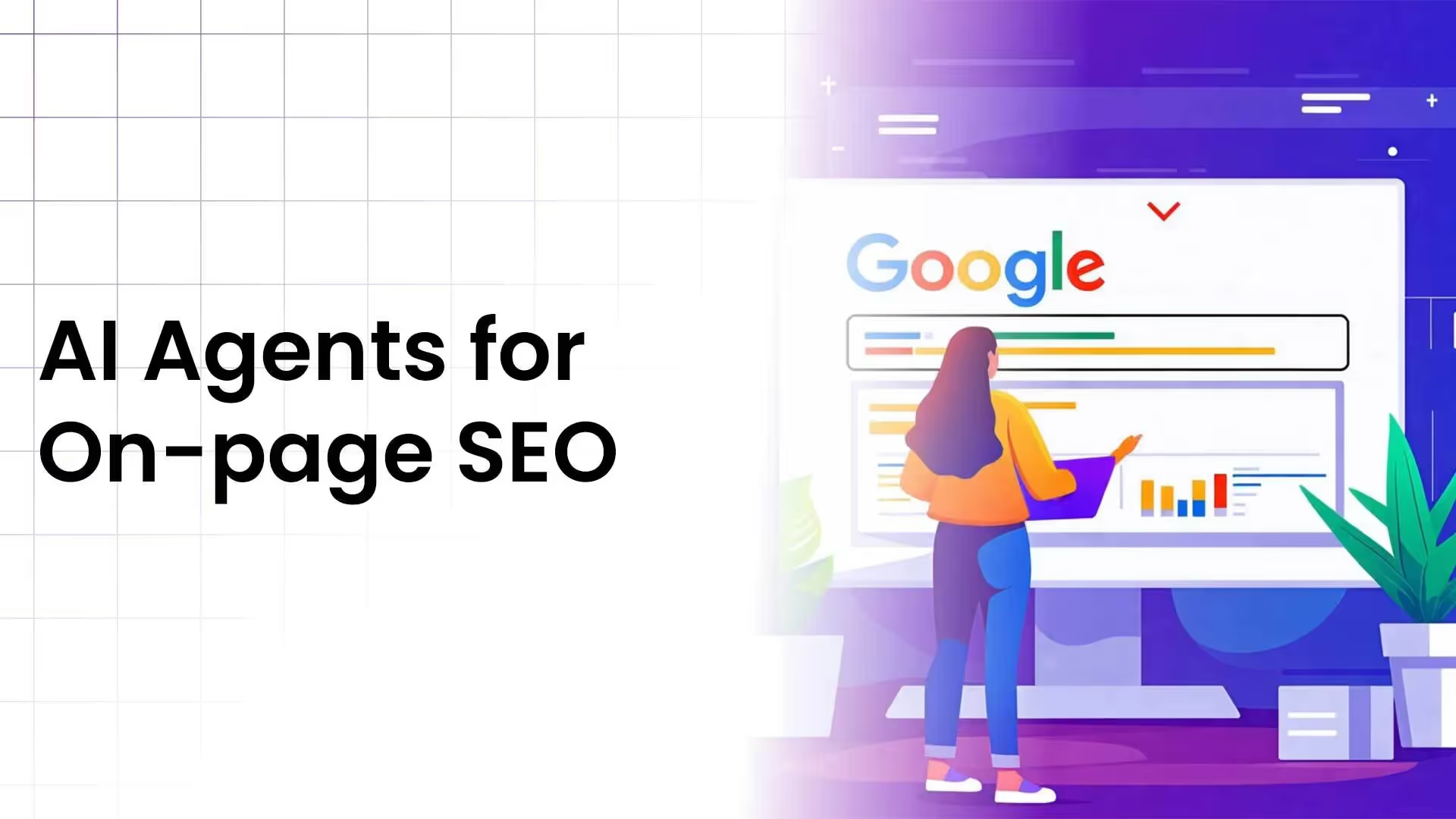You are a part of the SEO team at a fast-growing e-commerce brand. Every week, you’re neck-deep in work—updating product pages, fixing broken links, tweaking meta tags, running audits. It’s a constant game of catch-up. And still, your competitors manage to outrank you on Google—sometimes overnight. What if you had AI agents working behind the scenes, optimizing your site 24/7, fixing issues before they hurt your rankings, and surfacing opportunities before your rivals even notice?
This isn’t a future fantasy. In 2025, AI agents are fundamentally changing on-page SEO. According to Search Engine Land, brands using AI for SEO are seeing faster organic growth and higher ROI compared to those relying on manual processes. This blog explores how AI agents are transforming on-page SEO, making it smarter, faster, and more actionable than ever before.
What Is On-Page SEO?
On-page SEO is the process of optimizing individual web pages—content, structure, metadata, and links—to rank higher and attract more relevant traffic. Today, it’s not just about keywords. Google’s algorithms reward expertise, technical excellence, and user experience. Effective on-page SEO means:
- Ensuring your content matches search intent
- Optimizing technical elements like schema, internal links, and site speed
- Making data-driven decisions to maximize visibility and engagement
As Moz explains, on-page SEO is the foundation for any successful search strategy.
Why Traditional Process of On-Page SEO Holds You Back
Let’s face it: the old way of doing on-page SEO is slow and reactive. Teams spend precious time patching up issues after traffic drops or rankings slip. Data is scattered across different tools, making it tough to spot patterns or act fast. By the time you’ve manually updated meta tags or fixed broken links, competitors using smarter solutions have already moved ahead.
This piecemeal approach means you’re constantly playing defense—reacting to Google updates or competitor moves, not getting ahead of them. With search algorithms and user expectations shifting overnight, sticking to manual methods is a recipe for missed opportunities and wasted effort. To truly compete, marketers need tools that surface issues proactively, connect the dots across data sources, and turn on-page SEO into a strategic advantage.
Role of AI Agents in On-Page SEO
AI agents are making on-page SEO faster, smarter, and more effective. Here’s how:
Automatic Site Audits:
AI agents crawl your site continuously, flagging technical issues—broken links, duplicate content, missing alt text—before they impact rankings. Tools like SEMrush and Ahrefs now offer real-time, AI-powered audits.
Spotting Optimization Opportunities:
AI agents analyze your content against top-ranking competitors, suggesting keyword, structure, and readability improvements. SurferSEO and Clearscope use NLP to recommend changes that align with search intent.
Real-Time SERP Monitoring:
Search results change fast. AI agents track SERP features, competitor moves, and algorithm updates, alerting you to shifts that could affect your rankings. Platforms like RankScience provide instant insights for rapid adaptation.
Implementing Schema and Structured Data:
AI agents can generate and validate schema markup automatically, helping your content qualify for rich results and featured snippets—an essential for modern SEO.
Smart Internal Linking:
AI-driven tools identify orphaned pages and recommend contextual internal links, improving crawlability and user engagement. MarketMuse clusters content and suggests linking strategies that boost topical authority.
Prioritizing Fixes and Suggestions:
AI agents flag problems and rank them by SEO impact, so your team focuses on what matters most.
Using Ask Yarnit for On-Page SEO
Step 1: The Ask

Upload your site audit reports, content drafts, or simply use a prompt like below and also add your site as a reference by using the attachment icon on Ask Yarnit:
“Audit my product pages for on-page SEO. Highlight technical issues, suggest improvements to meta tags, internal links, and schema markup, and recommend a content structure that aligns with current search intent.”
Step 2: The Solution

Ask Yarnit’s specialized AI agents get to work by:
- Analyzing your site’s content and structure alongside top competitors and industry benchmarks
- Detecting on-page SEO issues, including broken links, missing alt text, duplicate content, and under-optimized metadata
- Recommending keyword enhancements, internal linking strategies, and schema markup to boost visibility and engagement
- Suggesting actionable improvements, such as optimizing headings, improving content clarity, and enhancing page speed.
- Providing a prioritized checklist and a clear, SEO-optimized outline for your content updates
Step 3: Behind the Scenes

What sets Ask Yarnit apart is its transparent “behind the scenes” approach. For every recommendation, Yarnit:
- Uses SEOAuditAgent to scan and diagnose technical errors in real time
- Employs ContentAgent to benchmark your content against top-ranking competitors, ensuring your pages meet or exceed industry standards
- Leverages SERPMonitorAgent to track changes in search results and competitor strategies, so your site stays ahead of algorithm updates
Together, these agents deliver a comprehensive SEO action plan, suggest targeted content updates, and recommend SEO-friendly structures to maximize visibility.
Embrace AI Agents for Smarter SEO
The future of on-page SEO is all about working smarter, not harder. AI-powered tools are now able to handle the heavy lifting—think automating keyword research, flagging technical issues, and suggesting content improvements in real time. For marketers, this means AI keeps your site optimized, tracks performance, and adapts to search trends as they happen. To get the most out of AI, start by using tools to streamline repetitive tasks, monitor your SEO metrics closely, and let machine learning highlight new keywords or linking opportunities you might otherwise miss.
Try Ask Yarnit to automate your on-page SEO, get actionable insights instantly, and keep your brand ahead!










